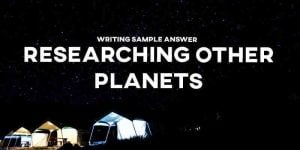This is an IELTS writing task 2 sample answer essay on the topic of space travel from the real IELTS exam.
Please consider supporting my efforts to creative high quality IELTS materials for students around the world by signing up for my Patreon (and so you won’t miss out on any of my exclusive IELTS Ebooks)!
Dave
IELTS Essay: Space Travel
The first man to walk on the moon claimed it was a step forward for mankind. However, it has made little difference in most people’s lives.
To what extent do you agree or disagree?
There are many who feel that research into space exploration has not made sufficient impact in the average individual’s life to justify its expense. In my opinion, there are valid reasons to ask this question but overall the cultural and scientific effect is all-encompassing.
Those who decry the wasted resources directed towards space programs point out the lack of readily apparent benefits. Sending a man to the moon and maintaining expensive telescopes and space stations do nothing for the average person struggling to pay their bills and vulnerable to sudden economic downturns. Most may casually watch the moon landing or the occasional NASA video on YouTube but that is hardly justification for billions of dollars over decades that could have made a real difference if diverted towards medicine, education, infrastructure, and a vibrant employment sector.
Nonetheless, the effects pertain deeply to culture and science. Firstly, putting a man on the moon was a moment that transcends mundane utilitarian concerns. It not only was an exercise in the power and majesty of the human race but also inspired countless individuals across a wide variety of industries to push for great achievements and have pride in mankind. Secondly, the advances made while researching space have led to concrete, beneficial discoveries. For example, there are now satellites in space making possible phone calls and internet access nearly everywhere on Earth. Countless other large and small innovations from microchips to increased fuel efficiency are also to some degree indebted to the national funding of space exploration.
In conclusion, far from being a waste of valuable resources, space exploration has been the driving force behind the continued progress of humanity. It should therefore continue to receive support.
Analysis
1. There are many who feel that research into space exploration has not made sufficient impact in the average individual’s life to justify its expense. 2. In my opinion, there are valid reasons to ask this question but overall the cultural and scientific effect is all-encompassing.
- Paraphrase the overall essay topic.
- Write a clear opinion. Read more about introductions here.
1. Those who decry the wasted resources directed towards space programs point out the lack of readily apparent benefits. 2. Sending a man to the moon and maintaining expensive telescopes and space stations do nothing for the average person struggling to pay their bills and vulnerable to sudden economic downturns. 3. Most may casually watch the moon landing or the occasional NASA video on YouTube but that is hardly justification for billions of dollars over decades that could have made a real difference if diverted towards medicine, education, infrastructure, and a vibrant employment sector.
- Write a topic sentence with a clear main idea at the end.
- Develop the idea.
- Use specific examples. Aim for 4-5 sentences in a paragraph – not 3 like I did in this one…
1. Nonetheless, the effects pertain deeply to culture and science. 2. Firstly, putting a man on the moon was a moment that transcends mundane utilitarian concerns. 3. It not only was an exercise in the power and majesty of the human race but also inspired countless individuals across a wide variety of industries to push for great achievements and have pride in mankind. 4. Secondly, the advances made while researching space have led to concrete, beneficial discoveries. 5. For example, there are now satellites in space making possible phone calls and internet access nearly everywhere on Earth. 6. Countless other large and small innovations from microchips to increased fuel efficiency are also to some degree indebted to the national funding of space exploration.
- Write another topic sentence with a new main idea at the end.
- Explain it.
- Develop it as fully as possible.
- If you have a second main idea, switch over to it.
- Develop that one with an example.
- Finish developing it fully.
1. In conclusion, far from being a waste of valuable resources, space exploration has been the driving force behind the continued progress of humanity. 2. It should therefore continue to receive support.
- Repeat your opinion and summarise your main ideas.
- Add a final thought. Read more about conclusions here.
Vocabulary
What do the words in bold below mean?
There are many who feel that research into space exploration has not made sufficient impact in the average individual’s life to justify its expense. In my opinion, there are valid reasons to ask this question but overall the cultural and scientific effect is all-encompassing.
Those who decry the wasted resources directed towards space programs point out the lack of readily apparent benefits. Sending a man to the moon and maintaining expensive telescopes and space stations do nothing for the average person struggling to pay their bills and vulnerable to sudden economic downturns. Most may casually watch the moon landing or the occasional NASA video on YouTube but that is hardly justification for billions of dollars over decades that could have made a real difference if diverted towards medicine, education, infrastructure, and a vibrant employment sector.
Nonetheless, the effects pertain deeply to culture and science. Firstly, putting a man on the moon was a moment that transcends mundane utilitarian concerns. It not only was an exercise in the power and majesty of the human race but also inspired countless individuals across a wide variety of industries to push for great achievements and have pride in mankind. Secondly, the advances made while researching space have led to concrete, beneficial discoveries. For example, there are now satellites in space making possible phone calls and internet access nearly everywhere on Earth. Countless other large and small innovations from microchips to increased fuel efficiency are also to some degree indebted to the national funding of space exploration.
In conclusion, far from being a waste of valuable resources, space exploration has been the driving force behind the continued progress of humanity. It should therefore continue to receive support.
Answers
space exploration going to other planets, space
sufficient impact enough of an effect
average individual’s life normal person’s day to day life
justify give reason for
expense money, time
valid reasons good justifications
overall in general
cultural related to culture, art, society
scientific effect impact on technology, science
all-encompassing touches all
decry are critical of
wasted resources not well used
directed towards given to
space programs funding for space research
point out argue
lack don’t have
readily apparent benefits obvious advantages
maintaining expensive telescopes keeping up equipment
space stations places in space to do research
struggling to pay their bills having a tough time affording
vulnerable weak
sudden economic downturns the economy getting worse
casually without much care
moon landing getting to the moon
NASA American space agency
hardly justification not enough to give reason for
decades many years
real difference actual impact
diverted towards sent to
medicine health
education schools
infrastructure roads, buildings, etc.
a vibrant employment sector good jobs for everyone
nonetheless regardless
pertain deeply have a lot to do with
moment achievement
transcends mundane utilitarian goes beyond what is useful
exercise show
majesty power/beauty
human race mankind
inspired countless individuals encouraged many people
across a wide variety of industries in many fields
push try
pride self-esteem
mankind humanity
advances progress
concrete real
beneficial discoveries advantageous innovations
satellites things in space that help our phones
making possible allowing for
nearly almost
countless unlimited
innovations new ideas
microchips small computer chips
increased fuel efficiency using fuel better
to some degree indebted at least a little because of
national funding countries giving money
space exploration going out into space
far from being definitely not
valuable resources important money, time, etc.
driving force behind main push behind
continued progress keep getting better
receive support get money
Pronunciation
speɪs ˌɛksplɔːˈreɪʃən
səˈfɪʃənt ˈɪmpækt
ˈævərɪʤ ˌɪndɪˈvɪdjʊəlz laɪf
ˈʤʌstɪfaɪ
ɪksˈpɛns
ˈvælɪd ˈriːznz
ˈəʊvərɔːl
ˈkʌlʧərəl
ˌsaɪənˈtɪfɪk ɪˈfɛkt
ɔːl-ɪnˈkʌmpəsɪŋ
dɪˈkraɪ
ˈweɪstɪd rɪˈsɔːsɪz
dɪˈrɛktɪd təˈwɔːdz
speɪs ˈprəʊgræmz
pɔɪnt aʊt
læk
ˈrɛdɪli əˈpærənt ˈbɛnɪfɪts
meɪnˈteɪnɪŋ ɪksˈpɛnsɪv ˈtɛlɪskəʊps
speɪs ˈsteɪʃənz
ˈstrʌglɪŋ tuː peɪ ðeə bɪlz
ˈvʌlnərəbl
ˈsʌdn ˌiːkəˈnɒmɪk ˈdaʊntɜːnz
ˈkæʒjʊəli
muːn ˈlændɪŋ
ˈnæsə
ˈhɑːdli ˌʤʌstɪfɪˈkeɪʃən
ˈdɛkeɪdz
rɪəl ˈdɪfrəns
daɪˈvɜːtɪd təˈwɔːdz
ˈmɛdsɪn
ˌɛdju(ː)ˈkeɪʃən
ˈɪnfrəˌstrʌkʧə
ə ˈvaɪbrənt ɪmˈplɔɪmənt ˈsɛktə
ˌnʌnðəˈlɛs
pɜːˈteɪn ˈdiːpli
ˈməʊmənt
trænˈsɛndz ˈmʌndeɪn ˌjuːtɪlɪˈteərɪən
ˈɛksəsaɪz
ˈmæʤɪsti
ˈhjuːmən reɪs
ɪnˈspaɪəd ˈkaʊntlɪs ˌɪndɪˈvɪdjʊəlz
əˈkrɒs ə waɪd vəˈraɪəti ɒv ˈɪndəstriz
pʊʃ
praɪd
mænˈkaɪnd
ədˈvɑːnsɪz
ˈkɒnkriːt
ˌbɛnɪˈfɪʃəl dɪsˈkʌvəriz
ˈsætəlaɪts
ˈmeɪkɪŋ ˈpɒsəbl
ˈnɪəli
ˈkaʊntlɪs
ˌɪnəʊˈveɪʃənz
ˈmaɪkrəʊˌʧɪps
ɪnˈkriːst fjʊəl ɪˈfɪʃənsi
tuː sʌm dɪˈgriː ɪnˈdɛtɪd
ˈnæʃənl ˈfʌndɪŋ
speɪs ˌɛksplɔːˈreɪʃən
fɑː frɒm ˈbiːɪŋ
ˈvæljʊəbl rɪˈsɔːsɪz
ˈdraɪvɪŋ fɔːs bɪˈhaɪnd
kənˈtɪnju(ː)d ˈprəʊgrəs
rɪˈsiːv səˈpɔːt
Vocabulary Practice
Remember and fill in the blanks:
There are many who feel that research into s_________________n has not made s_______________t in the a__________________e to j_______y its e_______e. In my opinion, there are v____________s to ask this question but o________l the c__________l and s______________t is a___________________g.
Those who d_______y the w_________________s d__________________s s_________________s p_____________t the l_____k of r______________________________s. Sending a man to the moon and m_____________________________s and s______________s do nothing for the average person s__________________________s and v_______________e to s____________________________s. Most may c______________y watch the m_________________g or the occasional N______A video on YouTube but that is h___________________n for billions of dollars over d_____________s that could have made a r_______________e if d_________________s m__________e, e___________n, i_________________e, and a___________________________r.
N______________s, the effects p_______________y to culture and science. Firstly, putting a man on the moon was a m____________t that t__________________________________n concerns. It not only was an e____________e in the power and m__________y of the h_____________e but also i________________________s a____________________________s to p____h for great achievements and have p_____e in m_________d. Secondly, the a_____________s made while researching space have led to c__________e, b____________________s. For example, there are now s_____________s in space m_____________________e phone calls and internet access n________y everywhere on Earth. C___________s other large and small i____________________s from m__________________s to i__________________________y are also t_______________________________d to the n_____________________g of s__________________n.
In conclusion, f_____________________g a waste of v________________________s, space exploration has been the d_______________________d the c________________________s of humanity. It should therefore continue to r___________________t.
Listening Practice
Learn more about this topic in the video below and practice with these activities:
Reading Practice
Read more about this topic and use these ideas to practice:
https://www.wired.com/story/space-exploration-and-the-age-of-the-anthropocosmos/
Speaking Practice
Practice with the following speaking questions from the real IELTS speaking exam:
Stars/Space
- Do people in your country often look at the stars?
- Why is it important to explore space?
- How can learning about space impact the daily lives of people?
- Will we find life on other planets?
- When will humans live on other planets?
Writing Practice
Practice with the related topic below and then check with my sample answer:
In the future, people may have to live on other planets. Some think that it is therefore important to spend money researching other planets such as Mars.
To what extent do you agree or disagree?







Appropirate use of vocabulary and ideas
Thanks – I try!
Neil Armstrong was celebrated globally when he first journeyed to the moon, but despite the pride he brought to the world, to claim that it was a giant leap forward for mankind was a statement that did not hold true to this day. It had little value in the general populace because the exploration of the moon did not result in ground-breaking innovations that would better people’s lives.
Firstly, recent years have shown that there is nothing more to unearth on the moon. Although moon exploration might have helped researchers to study space technology, nothing extraordinary has been discovered to encourage pursuing the same undertaking. As a matter of fact, a report from New York Times in March 2020 found that scientists and astronauts could be doing more harm than good when they leave footprints and debris on the moon’s surface that could potentially disrupt its natural balance.
Perhaps the most significant reason why we doubt its value is largely based on the money spent on this journey. It takes millions of dollars to send someone to space, and this money could be otherwise spent on more important things that would actually matter such as health care and education. At the same time, the International Space Station already gives researchers a glance of the moon so they can remotely make studies in the comfort of their offices, eliminating the need to travel to the moon.
In conclusion, while the first step on the moon left a mark on history and can be viewed as a scientific success, this has not resulted in life-changing innovations that would prove its worth. Therefore, governments should focus their attention, and more importantly the funds where it is most needed.
Nice job, Chris!
Thaku ☺Really helpful.
Awesome
Thank you!